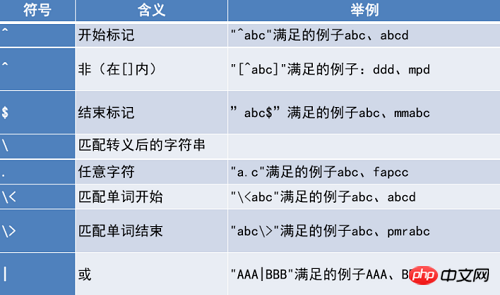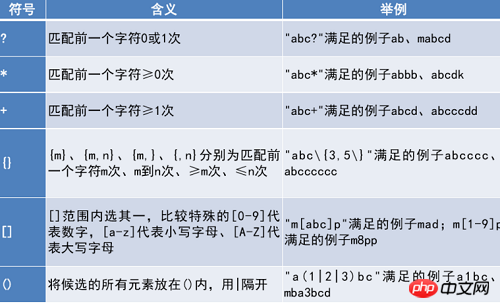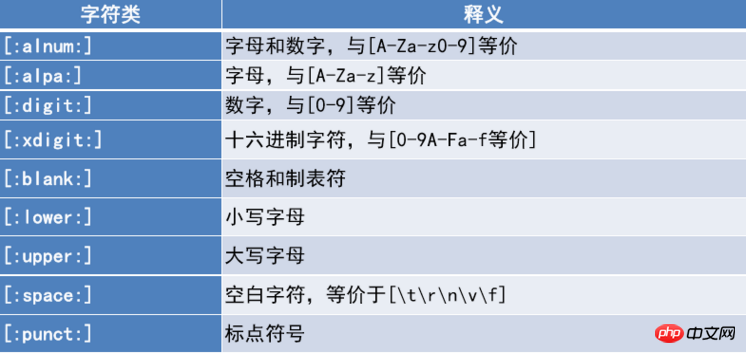
L'
Regularexpression correspond à la chaîne qualifiée dans le fichier. Cet article vous présentera le joker et les expressions régulières sous linux. Les amis qui en ont besoin peuvent se référer à
wildcard <.>
* N'importe quel caractère, peut être répété plusieurs fois ? N'importe quel caractère, répété une fois
[] représente un caractère
du nom de fichier
expression régulière ls find cp ne prend pas en charge les expressions régulières , mais grep awk sed prend en charge les expressions régulières[root@hadoop-bigdata01 test]# touch aa [root@hadoop-bigdata01 test]# touch aab aabb [root@hadoop-bigdata01 test]# ll total 0 -rw-r--r-- 1 root root 0 May 16 19:47 aa -rw-r--r-- 1 root root 0 May 16 19:47 aab -rw-r--r-- 1 root root 0 May 16 19:47 aabb [root@hadoop-bigdata01 test]# ls aa aa [root@hadoop-bigdata01 test]# ls aa? aab [root@hadoop-bigdata01 test]# ls aa* aa aab aabb



grep "1" /etc/passwd
[root@hadoop-bigdata01 test]# grep "1" /etc/passwd bin:x:1:1:bin:/bin:/sbin/nologin mail:x:8:12:mail:/var/spool/mail:/sbin/nologin uucp:x:10:14:uucp:/var/spool/uucp:/sbin/nologin operator:x:11:0:operator:/root:/sbin/nologin games:x:12:100:games:/usr/games:/sbin/nologin gopher:x:13:30:gopher:/var/gopher:/sbin/nologin ftp:x:14:50:FTP User:/var/ftp:/sbin/nologin dbus:x:81:81:System message bus:/:/sbin/nologin usbmuxd:x:113:113:usbmuxd user:/:/sbin/nologin avahi-autoipd:x:170:170:Avahi IPv4LL Stack:/var/lib/avahi-autoipd:/sbin/nologin abrt:x:173:173::/etc/abrt:/sbin/nologin wang:x:501:501::/home/wang:/bin/bash grep 'root' /etc/passwd cat /etc/passwd | grep 'root'
grep '[0-9]' /etc/passwd
grep '[0-9][0-9][0-9]' /etc/passwd 或者 grep ':[0-9][0-9][0-9]:' /etc/passwd
[root@hadoop-bigdata01 test]# grep '[0-9][0-9][0-9]' /etc/passwd games:x:12:100:games:/usr/games:/sbin/nologin usbmuxd:x:113:113:usbmuxd user:/:/sbin/nologin rtkit:x:499:497:RealtimeKit:/proc:/sbin/nologin avahi-autoipd:x:170:170:Avahi IPv4LL Stack:/var/lib/avahi-autoipd:/sbin/nologin abrt:x:173:173::/etc/abrt:/sbin/nologin nfsnobody:x:65534:65534:Anonymous NFS User:/var/lib/nfs:/sbin/nologin saslauth:x:498:76:"Saslauthd user":/var/empty/saslauth:/sbin/nologin pulse:x:497:496:PulseAudio System Daemon:/var/run/pulse:/sbin/nologin liucheng:x:500:500::/home/liucheng:/bin/bash wang:x:501:501::/home/wang:/bin/bas
3. Faire correspondre les lignes commençant par r et se terminant par n
grep '^r.*n$' /etc/passwd .*代表所有 [root@hadoop-bigdata01 test]# grep '^r.*n$' /etc/passwd rpc:x:32:32:Rpcbind Daemon:/var/cache/rpcbind:/sbin/nologin rtkit:x:499:497:RealtimeKit:/proc:/sbin/nologin rpcuser:x:29:29:RPC Service User:/var/lib/nfs:/sbin/nologin
4. Filtrer ifconfig, intercepter ip
grep -v représente l'interception inversée, ce qui signifie supprimer les lignes avec un certain mot-clé sed signifie remplacement[root@hadoop-bigdata01 test]# ifconfig | grep 'inet addr:'
inet addr:192.168.126.191 Bcast:192.168.126.255 Mask:255.255.255.0
inet addr:127.0.0.1 Mask:255.0.0.0
[root@hadoop-bigdata01 test]#
[root@hadoop-bigdata01 test]# ifconfig | grep 'inet addr:' | grep -v '127.0.0.1'
inet addr:192.168.126.191 Bcast:192.168.126.255 Mask:255.255.255.0
[root@hadoop-bigdata01 test]# ifconfig | grep 'inet addr:' | grep -v '127.0.0.1' | sed 's/inet addr://g'
192.168.126.191 Bcast:192.168.126.255 Mask:255.255.255.0
[root@hadoop-bigdata01 test]# ifconfig | grep 'inet addr:' | grep -v '127.0.0.1' | sed 's/inet addr://g' | sed 's/Bcast.*//g'
192.168.126.191Malentendu
Il y a un malentendu ici. J'y réfléchis depuis longtemps. C'est la différence entre les expressions régulières et les caractères génériquesNous savons que la * signification des caractères génériques est n'importe quel caractère et peut être répétée. plusieurs fois. Le * dans l'expression régulière fait référence à la correspondance du caractère précédent >= 0 fois . Alors, comment puis-je savoir si le * que j'utilise est un caractère générique ou un caractère générique ? ExpressionAu début, je suis tombé dans un malentendu. Regardez la série de commandes suivante[root@hadoop-bigdata01 test]# touch ac aac abc abbc [root@hadoop-bigdata01 test]# ll total 0 -rw-r--r-- 1 root root 0 May 16 19:55 aac -rw-r--r-- 1 root root 0 May 16 19:55 abbc -rw-r--r-- 1 root root 0 May 16 19:55 abc -rw-r--r-- 1 root root 0 May 16 19:55 ac [root@hadoop-bigdata01 test]# ls | grep 'a*c' aac abbc abc ac [root@hadoop-bigdata01 test]# ls | grep 'a.*c' aac abbc abc ac [root@hadoop-bigdata01 test]# ls | grep '^a.*c' aac abbc abc ac [root@hadoop-bigdata01 test]# ls | grep '^a*c' aac ac
[root@hadoop-bigdata01 test]# ls a aac abb abbc abc ac b bb c cb [root@hadoop-bigdata01 test]# ls | grep 'a*b' abb abbc abc b bb cb
Ce qui précède est le contenu détaillé de. pour plus d'informations, suivez d'autres articles connexes sur le site Web de PHP en chinois!